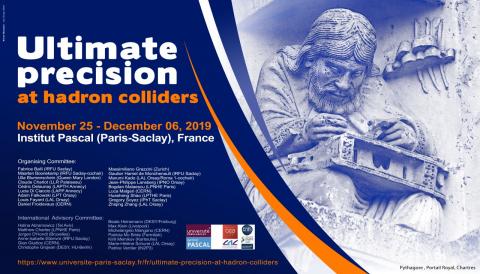Ultimate precision at hadron colliders
2019 and 2021: The dates of the next meeting are yet to be announced
Most recent event: 25th of November to 6th of December 2019.
View the program schedule here: Schedule
Organized by Maarten Boonekamp (IRFU-Saclay) and Marumi Kado (LAL, Orsay/Roma 1)
Rationale and Goals
With the approaching completion of the European Particle Strategy Update (EPPSU), the major collaborations have published or updated their physics potential. Detailed physics cases are described for potential future e+e- and pp colliders, as well as for the already decided HL-LHC. A very broad summary is that electron-positron colliders dominate the electroweak precision and the associated indirect new physics reach, while hadron colliders provide new physics reach in direct searches and a strong complementarity to electron-positron colliders in Higgs physics measurements, in particular for the measurements of rare decays, of the top Yukawa coupling, and of the Higgs boson self-couplings.
In our pursuit to understand and push the limits of Electroweak Precision at hadron colliders, with the recently submitted inputs to the EPPSU and the ongoing assessment of the potential of future projects for High Energy Physics, we propose a re-evaluation of the electroweak precision that can be achieved in the context of the HL-LHC, supported by future deep-inelastic scattering projects such as LHeC or the eIC, and in complementarity with existing low-energy experiments. While some of these projects are still speculative, they offer excellent physics potential at moderate cost, and should be considered independently of the future frontier e+e- and pp colliders.
This workshop aims at further discussing the assumptions made in the projections of the projects having submitted an input to the EPPSU and their complementarity in order to produce a synthetic evaluation of the precision reach of the HL-LHC.
Proposal
We propose to collect and address the open questions raised in the process of the preparation of the EPPSU and related to precision physics at the LHC. In order to do so we propose the organization of four study groups covering the main areas of precision at the LHC. A preliminary list of open question is provided and the study groups are kindly invited to start discussing these questions and include any relevant additional questions. The goal is to provide a synthetic summary on the ultimate precision reachable at the LHC. The groups will provide inputs to a dedicated two-week workshop end 2019 at Institut Pascal (IPa) in Orsay, which will be aimed at summarizing and concluding the effort. The topical study groups are the following.
Topical Workgroups
WG1: Measurements of EW precision observables W&Z mass, weak mixing angle, top mass and properties in relation with electroweak symmetry breaking.
WG2: Higgs boson properties and high-energy probes of EWSB Limiting systematic uncertainties in Higgs physics (not an exhaustive review), in particular related to PDFs and theoretical predictions. Diboson, VBS and Drell-Yan measurements. Identify the relevant observables for Global EFT interpretations (in the most relevant bases).
WG3: Fundamental parameters at low energy Prospects for g-2, Δαhad, sin2θW in ep scattering, etc.
WG4: The proton structure - towards ultimate PDFs Critical review of HL-LHC and LHeC prospects. What are the limitations to be overcome to achieve the advertised precision (e.g. what is the required theory accuracy?).
WG5: Global interpretation Challenges and prospects for the EW fit and the (SM)EFT.
Timeline and deliverable
The workshop at IPa would serve to host discussions in person, and conclude where possible. Therefore we propose :
1) preparatory meetings of the organizing committe, in person or via visio-conference, in the course of 2019. The first meeting has taken place March 21. Subsequent meetings will be devoted to review the progress made.
2) a two-week-long workshop at IPa, from Nov. 25 to Dec. 6 2019. This workshop would serve to discuss the topics of the various working groups, and to conclude where possible. The format would be as follows:
-
Workshop Part I - preparatory week
Introductory session with summaries of the preparatory discussions from ach group. The week will then be devoted to the meetings of the working groups with topical seminars every day with subjects chosen to stimulate further discussions within the groups in view of preparing Part II of the workshop and the write-up.
-
Workshop Part II - plenary meeting
Plenary sessions to discuss the status and conclusions of each working group with a half-day session for each WG. Specialised talks given by the participants to stimulate discussions on the work done in the working groups.
Summaries of the working group results.
The objective is to deliver a concise write up which should be made available prior to the EPPSU summary meeting in January 2020.

Organising Committee :
- Fabrice Balli (IRFU Saclay)
- Maarten Boonekamp (IRFU Saclay-cochair)
- Ulla Blumenschein (Queen Mary London)
- Claude Charlot (LLR Palaiseau)
- Cédric Delaunay (LAPTH Annecy)
- Lucia Di Ciaccio (LAPP Annecy)
- Adam Falkowski (LPT Orsay)
- Louis Fayard (LAL Orsay)
- Daniel Froidevaux (CERN)
- Massimiliano Grazzini (Zurich)
- Gautier Hamel de Monchenault (IRFU Saclay)
- Marumi Kado (LAL Orsay/Roma 1-cochair)
- Jean-Philippe Lansberg (IPNO Orsay)
- Bogdan Malaescu (LPNHE Paris)
- Luca Malgeri (CERN)
- Huasheng Shao (LPTHE Paris)
- Gregory Soyez (IPhT Saclay)
- Zhiqing Zhang (LAL Orsay)
International Advisory Committee
- Halina Abramowicz (Tel Aviv)
- Matthew Charles (LPNHE Paris)
- Jorgen D'Hondt (Bruxelles)
- Anne-Isabelle Etienvre (IRFU Saclay)
- Gian Giudice (CERN)
- Christophe Grojean (DESY, HU-Berlin)
- Beate Heinemann (DESY/Freiburg)
- Max Klein (Liverpool)
- Michelangelo Mangano (CERN)
- Patricia Mc Bride (Fermilab)
- Kirill Melnikov (Karlsruhe)
- Marie-Hélène Schune (LAL Orsay)
- Patrice Verdier (IN2P3)